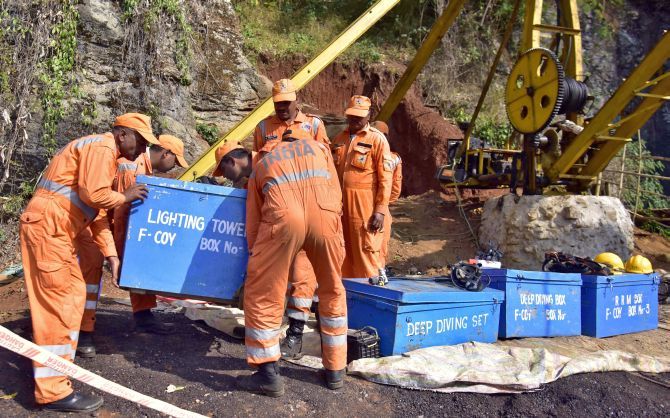How can a chief minister shrug off his responsibility not just for the illegality taking place under his nose but also for the lives that are likely lost? asks Aditi Phadnis.

Meghalaya Chief Minister Conrad Sangma has said that he has always been aware that illegal mining has been going on in his state and while everything was being done to extricate miners trapped in one of the many 'rat-hole/ mines in the state, it wasn't anyone's fault: The situation was just too difficult.
This is fit to take your breath away. How can a chief minister simply shrug off his responsibility: Not just for the illegality taking place under his nose that he admits to knowing about but also for the lives that are likely lost?
But then Meghalaya, the tiny state, makes for high stake politics.
Research by the Delhi-based Association for Democratic Reforms reveals that of a total 370 candidates who contested the 2018 Meghalaya assembly elections, only 4 per cent filed income tax returns.
Forty one per cent of the candidates reported they had assets of Rs 10 million and above. And just by way of illustration, Ngaitlang Dhar contested as a Congress candidate in 2013 and reported movable assets amounting Rs 250 million.
In 2018, he contested from the National People's Party and his movable assets amounted to Rs 720 million.
Presumably illegal mining on which no taxes are paid, no permissions are necessary and everyone is involved, is one source of income. This is probably why politics, a major source of influence, is such a lucrative profession in the state.
But what is the politics of Meghalaya about, apart from income?
The principal rivalry is between the Khasi and Garo tribes, with those from the Lushai Hills coming in the way.
The first is represented by the now retired D D Lapang, the second by the Sangma clan and the third by gentleman politician P R Kyndiah till he died in 2015.
The tension between these three regions constitutes the politics in the state.
The most famous Meghalaya politician would have to be Purno Aitok Sangma, former Speaker of the Lok Sabha, who was with the Congress until Sharad Pawar of the Nationalist Congress Party plucked him out from there.
In 2012, friends and some enemies egged on Purno Sangma to contest the post of President of India. His daughter Agatha had contested the Lok Sabha seat he had vacated in 2004 and won it. She was quickly sworn in as minister of state for rural development in the Manmohan Singh government.
When Sangma decided to contest against the Congress candidate, Agatha had to resign -- the NCP was part of the UPA and committed to backing Pranab Mukherjee, the man who finally became President of India.
Sangma himself quit the NCP to float the National People's Party.
Before he died in 2016, Sangma had launched his two sons Conrad and James -- 40 and 42 -- in politics. In 2008, as dynasties go, the Sangma dynasty had done pretty well for itself.
Between P A Sangma, Conrad and James, the Sangma family controlled 5% of the 60-member Assembly. Conrad was thought to be the well-spoken, highly ambitious, son of a famous father in the area.
In 2018, the NPP won 19 seats in the 60-member Meghalaya assembly. Conrad fashioned an alliance of other smaller parties including two BJP MLAs. This is in power now, but party loyalties in Meghalaya are ephemeral and crossing the floor takes no effort at all.
So what happens now?
Does the BJP, admittedly as only a minor ally, accept its responsibility in sending innocents to their death?
Will the central government intervene to ask Conrad to come down on illegal mining with a heavy hand?
What if he chooses to ignore the advice and simply changes alliance partners?
Then what happens to the Meghalaya leg of the BJP’s bigger project in the North East?
Right now, subtle power play is going on.
Conrad Sangma has let it generally be known that he had kept the Centre in the loop on the mining 'accident' by seeking help from Kiren Rijiju, minister of state for home affairs, also from the north east (Arunachal Pradesh).
So in a sense, the blame game has begun.
The chances are the BJP will be patient for the moment: Too many alliance partners are walking out for comfort. And it is in everyone's political interests to see the end to the current crisis.
As to the structural problem of illegal mining -- no doubt, that will be considered some other time.












